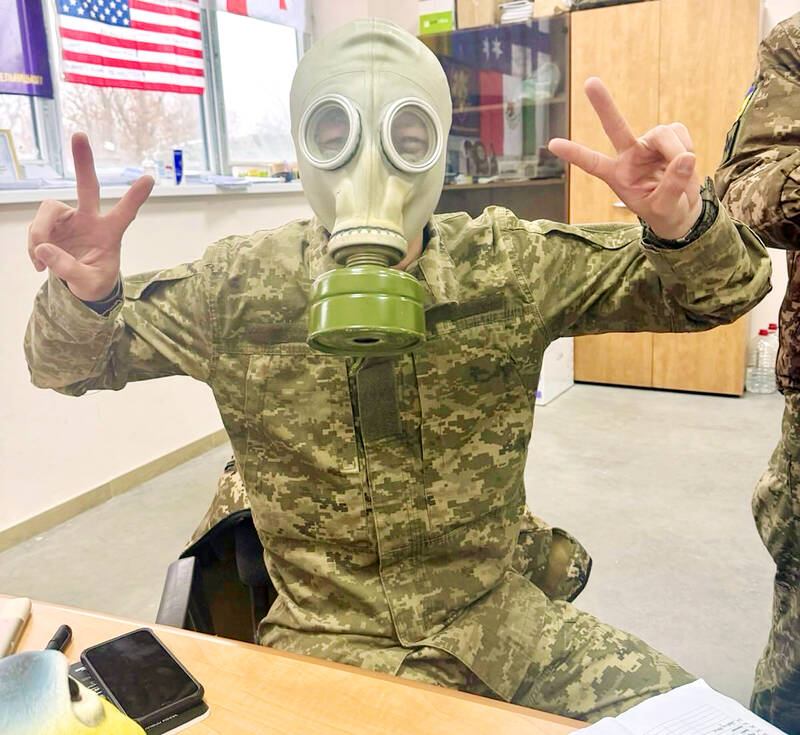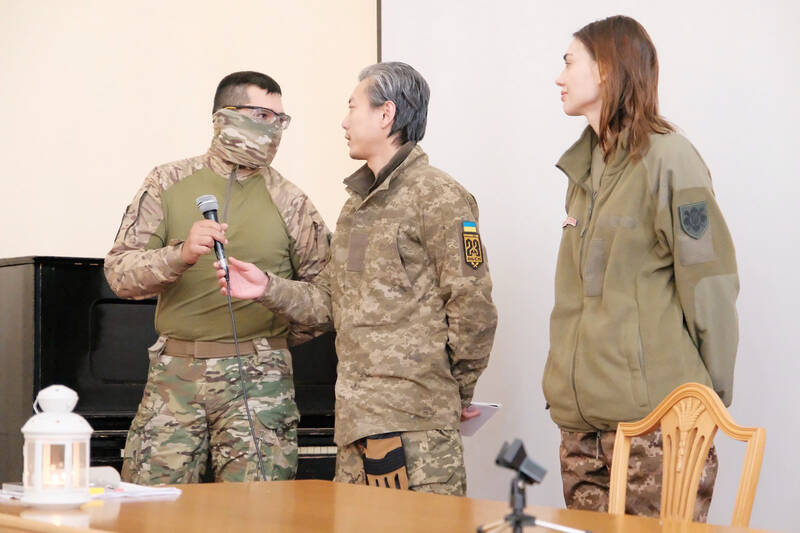Even by the standards of Ukraine’s International Legion, which comprises volunteers from over 55 countries, Han has an unusual backstory. Born in Taichung, he grew up in Costa Rica — then one of Taiwan’s diplomatic allies — where a relative worked for the embassy.
After attending an American international high school in San Jose, Costa Rica’s capital, Han — who prefers to use only his given name for OPSEC (operations security) reasons — moved to the US in his teens. He attended Penn State University before returning to Taiwan to work in the semiconductor industry in Kaohsiung, where he met an American woman who was teaching English in the city.
“She was a lot older than me and went back to the States where she had my son,” he says. “After that, I was bouncing around — back to Costa, back to the States …”

Photo courtesy of Han
With a firearms license and shooting experience, Han says it had always been his intention to return and do his military service in Taiwan with a view to pursuing a career in the military. He was motivated, in part, by China’s increased bellicosity and the belief that Taiwan needed all the help it could get. Yet, he was discouraged by relatives who had completed their service and called it “a waste of time.” Considering his options when Han heard the story of Jonathan Tseng (曾聖光), the first Taiwanese soldier to die in Ukraine.
Also known by his indigenous Amis name Sincyang Diway, the 25-year-old Hualien native Tseng was killed in a mortar bombardment in Luhansk Oblast, Ukraine’s easternmost province, in October 2022. In a memorial service in Lviv, Tseng’s family were presented with medals and other commemorative items, and he was later awarded Ukraine’s Order of Courage third class.
“They celebrated him like a hero,” Han says. “I thought that was cool.”

Photo courtesy of Han
Having served in the Republic of China (ROC) Army for five years, rising to the rank of corporal, before being honorably discharged in 2021, Tseng was critical of Taiwan’s armed forces, calling the annual Han Kang Exercises “a performance,” criticizing established fighting techniques and strategies as outmoded, and branding the reserve mobilization system and civil defense practically “non-existent.”
FAMILY CONCERNS
The desire to receive hands-on combat experience that he could bring back to Taiwan appear to have been an important factor in Han’s decision to enlist with the International Legion in Ukraine four months after Russia’s invasion.

Photo courtesy of Han
While he lacked Tseng’s military background, his motivations in signing up were similar.
“Taiwan has 1.4 million in reserve, and none of them have combat experience, or any real experience other than training exercises,” he says. “It seemed like the obvious place to go and train.”
After saving what he felt was enough money, Han applied to join the Legion in April last year and was accepted in August. Ignoring the protests of friends and family, he flew to Warsaw and then Krakow in Poland before taking a bus into Ukraine.
“I knew the risks and that there was a good chance I wasn’t coming back alive,” he says. “But this was what I wanted to do.”
Before flying, Han says he had done “a lot of research” into the types of people who were serving in Ukraine. News reports had suggested that the average Ukrainian conscript was 50 years old (it’s currently reported to be between 43 and 45), and Han reasoned that, at 38, he would not be out of place.
LATIN CONTINGENT
“I’m not in great shape, and cardio is just not my thing,” he admits. While we talk via Signal, he takes drags on a vape, “But I’m active and can walk long distances.”
Things were much tougher than expected, with 7km, 30kg ruck march and brutal obstacle course taking their toll. Through physical exertion and, he believes, an injury sustained during these activities, Han ended up in the hospital.
“I was peeing blood,” he says
While recuperating in Lviv, he decided that a return to the Legion was unfeasible but still had no intention of leaving Ukraine.
“I realized I’m not a very good soldier, so maybe I should think of something else to be of value,” he says.
After volunteering to prepare MREs [Meal, Ready-to-Eat] for the front line, completing a TC3 [Tactical Combat Casualty Care] course and helping to manufacture 3D-printed drone munitions loaded with shrapnel, he finally found a niche as a translator and interpreter back in Kyiv.
Prior to fall 2023, recruits to the legion were required to speak English, Ukrainian or Russian but once this stipulation was waived, an influx of Spanish-speaking soldiers arrived. Estimating that Spanish-speakers — who like Italian speakers now have their own unit — comprise around 5 percent of the legion’s manpower, Han says that Colombia is particularly well represented.
FAVORABLE CONDITIONS
Perennial armed conflict in Colombia has produced experienced soldiers, many of whom are attracted by the relatively ample remuneration, says Han. While Colombian soldiers can earn as little as US$300 a month back home, in Ukraine, the figure could be as high as US$3,000, according to some reports. There is also the advantage that, unlike Ukrainians, who must sign up for three-year stints, the Colombians need commit to six months only.
With an increasing proportion of monolingual recruits, there has been a greater demand for interpreters and translators.
“It’s strange that Ukraine is where my Spanish fluency came in,” says Han. “But I’m just glad to be of use.”
Currently seconded to international recruitment, under land forces, Han hopes that his biggest contribution will be to “reach out and bring in” new Taiwanese recruits. Thus far, seven Taiwanese have officially served in Ukraine, though sources have privately indicated the real number is likely higher. Based on his information, Han says the number is 14, including two casualties.
In November last year, Kaohsiung-native Wu Chung-ta (吳忠達), a 44-year-old veteran of Taiwan’s Army Special Forces Command became the second Taiwanese to be killed in action. Like Tseng, Wu died in Luhansk, during Russian strafing of the region.
For his own part, Han has encountered only one other Taiwanese during his time in Ukraine — a chance meeting that took him by surprise. It came while he was applying for his tax code, a requirement for foreign volunteers.
“I heard one of the Ukrainian ladies behind the counter calling ‘Taiwan, Taiwan,’ which is my call sign, and I thought, ‘Are they talking to me?’” he recalls. “But I turned round and there was a Taiwanese guy.”
LOOMING DEADLINE
Describing the individual that he bumped into as “going to a specialized unit,” Han says that the soldier is not with the Legion but is reluctant to give more details than that. “He has my contact details and reaches out every now and then to see how I’m doing,” Han says. “But right now, he’s in a hot zone.”
Despite the obvious dangers that combatants face in Ukraine, Han believes the only way to get Taiwanese prepared for a possible Chinese invasion is to have a battle-hardened army.
“There’s a correlation with what could happen in 2027,” he says.
His reference is to the year identified by some analysts as Chinese President Xi Jinping’s (習近平) deadline for invading Taiwan.
“We need frontline experience,” Han says.
Most of all, he supports the view that, as democracies threatened and attacked by larger authoritarian neighbors, Taipei and Kyiv are natural allies.
“Taiwan and Ukraine have the same enemies,” he says. “Therefore, they should be helping each other.”
Having recently begun work on a marketing campaign to attract more Mandarin-speaking recruits, Han says a Chinese version of the Legion Web site will soon be online, allowing potential recruits to see which battalions and brigades they might join and which areas they can specialize in. It is part of an integrated effort by the Ministry of Defence of Ukraine to standardize recruitment procedures.
“The recipe has worked for Spanish speakers, so we just need to get this next phase going,” he says.
He emphasizes the necessity of moving quickly.
“Taiwan is running out of time,” he says. “So, the sooner the better.”

Oct. 27 to Nov. 2 Over a breakfast of soymilk and fried dough costing less than NT$400, seven officials and engineers agreed on a NT$400 million plan — unaware that it would mark the beginning of Taiwan’s semiconductor empire. It was a cold February morning in 1974. Gathered at the unassuming shop were Economics minister Sun Yun-hsuan (孫運璿), director-general of Transportation and Communications Kao Yu-shu (高玉樹), Industrial Technology Research Institute (ITRI) president Wang Chao-chen (王兆振), Telecommunications Laboratories director Kang Pao-huang (康寶煌), Executive Yuan secretary-general Fei Hua (費驊), director-general of Telecommunications Fang Hsien-chi (方賢齊) and Radio Corporation of America (RCA) Laboratories director Pan
The consensus on the Chinese Nationalist Party (KMT) chair race is that Cheng Li-wun (鄭麗文) ran a populist, ideological back-to-basics campaign and soundly defeated former Taipei mayor Hau Lung-bin (郝龍斌), the candidate backed by the big institutional players. Cheng tapped into a wave of popular enthusiasm within the KMT, while the institutional players’ get-out-the-vote abilities fell flat, suggesting their power has weakened significantly. Yet, a closer look at the race paints a more complicated picture, raising questions about some analysts’ conclusions, including my own. TURNOUT Here is a surprising statistic: Turnout was 130,678, or 39.46 percent of the 331,145 eligible party

The classic warmth of a good old-fashioned izakaya beckons you in, all cozy nooks and dark wood finishes, as tables order a third round and waiters sling tapas-sized bites and assorted — sometimes unidentifiable — skewered meats. But there’s a romantic hush about this Ximending (西門町) hotspot, with cocktails savored, plating elegant and never rushed and daters and diners lit by candlelight and chandelier. Each chair is mismatched and the assorted tables appear to be the fanciest picks from a nearby flea market. A naked sewing mannequin stands in a dimly lit corner, adorned with antique mirrors and draped foliage

The election of Cheng Li-wun (鄭麗文) as chair of the Chinese Nationalist Party (KMT) marked a triumphant return of pride in the “Chinese” in the party name. Cheng wants Taiwanese to be proud to call themselves Chinese again. The unambiguous winner was a return to the KMT ideology that formed in the early 2000s under then chairman Lien Chan (連戰) and president Ma Ying-jeou (馬英九) put into practice as far as he could, until ultimately thwarted by hundreds of thousands of protestors thronging the streets in what became known as the Sunflower movement in 2014. Cheng is an unambiguous Chinese ethnonationalist,